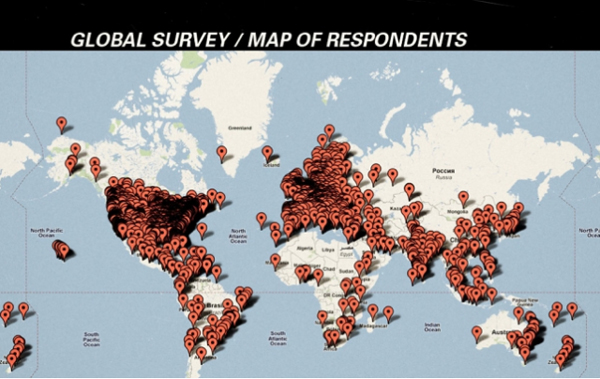Matt Mullenweg, founder of the WordPress web publishing platform, took the stage at the recent San Francisco WordCamp event to share the state of the WordPress union. A key figure: WordPress is now powering 14.7% of the top one million global websites. There’s more.Â
You’ve Come a Long Way, Baby
A few more impressive stats:Â
- 22 out of every 100 new active domains are running on WordPress
- The platform boasts 15,000 available plugins and has seen 200 million plugin downloads
- WordPress 3.2 had 500,000 downloads in the first two days, representing the fastest upgrade speed in the blogging platform’s history
The numbers are even better looking when we take a trip back in time. Last year WordPress was used by 8.5% of the world’s top million sites, so to see such growth in such a short time is certainly notable.
Up and Up
The cherry on top is the release of findings from the platform’s first user and developer survey (data available here), which received over 18,000 responses from people around the world. On the company’s official blog, Mullenweg ran through a few of the highlights:
We found a few interesting tidbits from the survey responses already, including that 6,800 self-employed respondents were responsible for over 170,000 sites personally, and charged a median hourly rate of $50. In tough economic times, it’s heartening to see Open Source creating so many jobs. (If each site took only 3 hours to make, that’s $29.5M of work at the average hourly rate.)
 Â
Â
Web CMS, or Not a Web CMS?
Once scoffed at for being referred to by some as a light-weight CMS, WordPress now powers over 50 million websites, including TechCrunch, GigaOm, VentureBeat, Jay Z’s Life + Times magazine and Cloud 365. This level of popularity is no surprise when considering the platform’s ease of use and relatively cheap pricing plans (free if you don’t buy a domain name), but the label battle rages on.Â
“You would think that after having 14.7% of the top millions sites and 22% of new domains people, including the author of this post, would be able to break away from calling WordPress a blogging platform,” asserted commenter Chris Daley on TechCrunch’s coverage of the news. “It is a CMS that has evolved from a blogging platform. Calling it a blogging platform is ignorant. Calling it a CMS, with unique differences than others, would be accurate.”
Meanwhile, Jeff Cram of CMSMyth documented a great debate that occurred on Twitter last year. Several CMS heads weighed in from all ends of the spectrum, but in the end Cram sided with Daley’s team:
In the grand scheme, this is a relatively trivial debate. Even the folks siding against WordPress as a CMS were for the most part arguing for a different label or pointing out that it wasn’t “enterprise†enough to be considered a true CMS.Â
As far as the final word goes, maybe at this point it doesn’t matter. Â Maybe at this point, all you need to know is that it works and it works well. Here’s the full speech from Mullenweg if you want more on that:
Useful article?
 Email It
 Â
 Â
